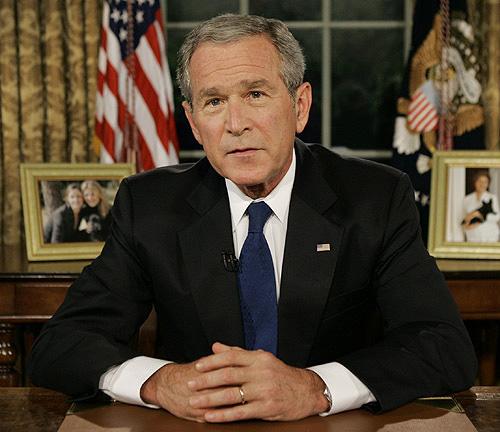Bush orders troop reduction

President George W. Bush pauses in the Oval Office at the White House on Thursday night after addressing the nation on his strategy for Iraq. THE ASSOCIATED PRESS, J. SCOTT APPLEWHITE
Sep 14, 2007
Last updated on May 12, 2016 at 03:49 p.m.
WASHINGTON – President Bush, defending an unpopular war, ordered gradual reductions in U.S. forces in Iraq on Thursday night and said, “The more successful we are, the more American troops can return home.”
Still, Bush firmly rejected calls to end the war, saying the insurgents who threaten Iraq’s future are a danger to U.S. national security. American troops must stay in the battle, Bush said, and more than 130,000 will remain after the newly ordered withdrawals are completed in July.
“The principle guiding my decisions on troop levels in Iraq is: return on success,” the president said.
Bush said 5,700 U.S. forces would be home by Christmas, and that four brigades-at least 21,500 troops-would return by July, along with an undetermined number of support forces. Now at its highest level of the war, the U.S. troop strength stands at 168,000.
Get The Daily Illini in your inbox!
With no dramatic change in course, Bush’s decision sets the stage for a fiery political debate in Congress, and on the 2008 presidential campaign trail. Democrats said Bush’s modest approach was unacceptable.
Sen. Jack Reed of Rhode Island, a former Army Ranger who delivered the Democratic response, said that “once again, the president failed to provide either a plan to successfully end the war or a convincing rationale to continue it.”
Reed said Democrats would work to “profoundly change our military involvement in Iraq.”
The reductions announced by Bush represented only a slight hastening of the originally scheduled end of the troop increase that Bush announced in January. When the cutbacks are complete, about 132,000 U.S. forces will be in Iraq.
Bush’s speech was the latest turning point in a 4 1/2-year-old war marred by miscalculations, surprises and setbacks.
Almost since the fall of Baghdad, in April 2003, U.S. commanders and administration officials in Washington mistakenly believed they were on the track to winding down U.S. involvement and handing off to the Iraqis. Instead, the insurgency intervened and the reality of a country in chaos conspired to deepen the U.S. commitment.
Bush said the U.S. engagement in Iraq will stretch beyond his presidency, requiring military, financial and political support from Washington. He said Iraqi leaders “have asked for an enduring relationship with America.
“And we are ready to begin building that relationship in a way that protects our interests in the region and requires many fewer American troops.”
Bush described the withdrawals, and the U.S. forces still fighting in Iraq, as a compromise on which war supporters and opponents could agree.
“The way forward I have described tonight makes it possible, for the first time in years, for people who have been on opposite sides of this difficult debate to come together,” Bush said.
That appeared highly unlikely, however, based on the reaction of Democratic leaders who want deadlines for withdrawals.





